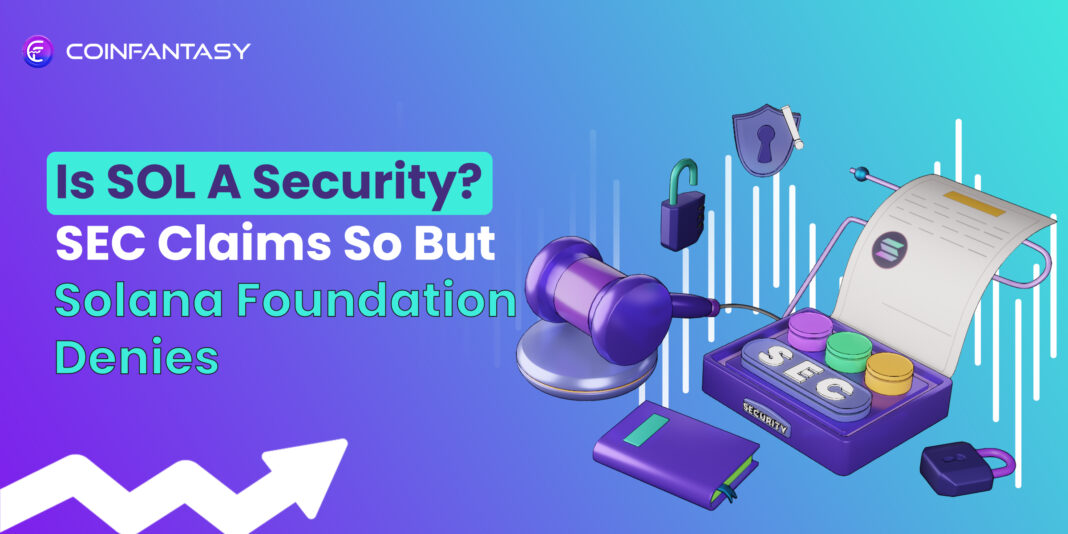For the first time, the Solana Organisation went to Twitter to confront the Securities and Exchange Commission’s designation of its native token, SOL as security.
“The Solana Organisation objects to the classification of its native token as a security,” the June 10 announcement says, adding that it appreciates politicians’ efforts to obtain legal clarification in the digital assets field.
Solana’s native and utility token became public in March 2020. Solana users stake the token to qualify for the consensus algorithm to approve transactions. Users may also utilize the token to get awards, make fees for transactions, and take part in governing.
https://twitter.com/SolanaFndn/status/1667578529612017666 (embed)
What is Solana Foundation’s Counteract to the SEC Lawsuit?
The SEC classified the SOL cryptocurrency as security in two distinct proceedings brought against Binance and Coinbase on June 5 and June 6. The categorization depends on numerous variables, including the expected gains from others’ work, and also how the tokens are utilized and sold.
“This categorization is important as it exposes Solana and related operations to an additional set of rules and compliance standards.” In a message to its community, the organization claimed, “We are continually working with legal specialists and in communication with the SEC to clarify and respond to their issues.”
In addition to Solana, the SEC classified nine additional cryptocurrencies in Binance’s complaint as securities: BNB, Binance USD, Solana, Cardano, Polygon, Cosmos, The Sandbox, Decentraland, Axie Infinity, and COTI. The SEC identified 13 cryptocurrencies in its Coinbase action, pushing out the recently categorized tokens and including six more such as Chiliz, Flow, Internet Computer, Near, Voyager Token, and Nexo.
What SEC Said About It?
The phrase “security” comprises an “investment agreement,” as well as additional assets such as bonds, equities, and transferring shares, stated the SEC. “A digital asset should be analyzed to figure out if it has the features of any good that falls within the standard of “security” under federal securities laws,” reads the agency in its advice for analyzing digital assets as contracts for investment.
In previous years, the Solana Foundation conducted confidential token sales, which meant that it issued assets to wealthy corporations and entrepreneurial companies. Its confidential sales were carried out by a simple agreement for future tokens (SAFT), which is a security issue for the potential sale of digital tokens from crypto developers to shareholders. Solana also submitted private offering documents with the SEC in connection with token sales via a SAFT, and buyers were lined up for lockups.
During Solana’s first coin released in March 2020, an open sale of SOL tokens was made, distributing 8 million tokens to consumers, representing 1.6% of the first token supply. The Solana Foundation received $1.76 million from the sale of tokens at $0.22 apiece.
Law specialist and Bloomberg writer Matt Levine stated in a recent article regarding the current events that earlier securities offerings of SOL should not constitute the token security being offered now. “From the SEC’s viewpoint, it is wrong that Solana tokens are now traded openly with less transparency and fewer investor protections than the SEC would prefer. But it’s not entirely Solana’s responsibility, or it is, but in a completely authorized way,” he explained.
Other Statements About SEC Laws
“The Solana Organisation is certain that SOL is not a security,” a representative for the foundation told Fortune in an announcement. We urge officials to keep active as regulatory partners in order to raise legal awareness on these concerns for the hundreds of firms that are establishing themselves in the virtual assets field throughout the United States, they added.
Similarly, the organization’s chief of policy, Amira Valliani, stated against the SEC’s accusations during a discussion titled “WTF is currently going on in crypto law” at the Solana NYC Hacker House, a conference for developers and investors.
“Now, I intend to talk about the elephant in the room,” she remarked, over ten minutes into the discussion. “Solana is not a type of security.”
The value of the tokens that the US government claimed were securities plummeted immediately after the federal government abandoned both claims. As reported by CoinMarketCap, Cardano’s ADA has dropped almost 5% since the Binance case became apparent. Polygon’s MATIC is down about 12%. SOL is also down almost 12%, falling from nearly $22 to $19.
Except for Solana, the structures that symbolize the 13 tokens have largely kept silent. However, The Sandbox’s founders and COO, whose cryptocurrency SAND was also mentioned in both cases, vehemently denied the SEC’s charges.
“We are certainly conscious of the SEC lawsuit brought against Binance and Coinbase in the United States,” Sebastien Borget stated at a meeting in Lisbon, according to Decrypt. “We are not always in accord with the categorization proposed in those legal actions, particularly the restriction of SAND as a security.”
Closing Thoughts
Since the SEC’s legislative double-tap against Binance and Coinbase, investment app Robinhood has announced that it would discontinue support for SOL, Polygon, and Cardano, citing the lawsuits as having “thrown a mass of distrust” over the cryptocurrency involved in the dispute.
Other corporations may follow the following, but in the meanwhile, each coin’s organization is working hard to retrieve its currency’s identity.

